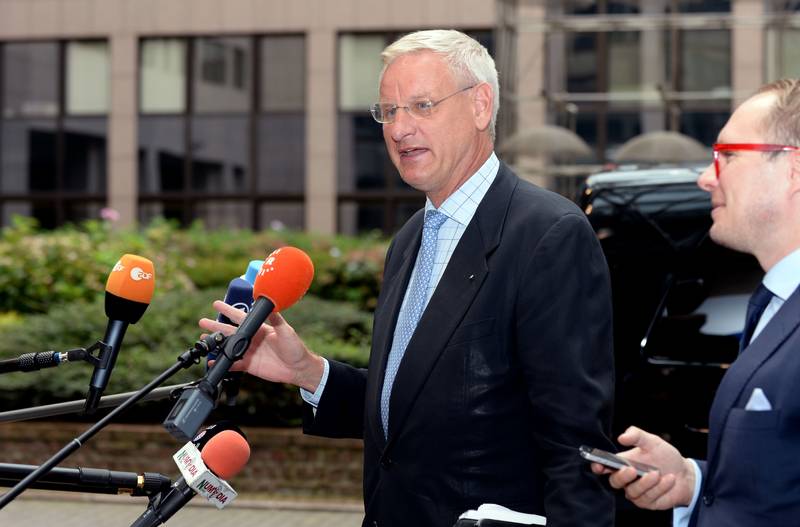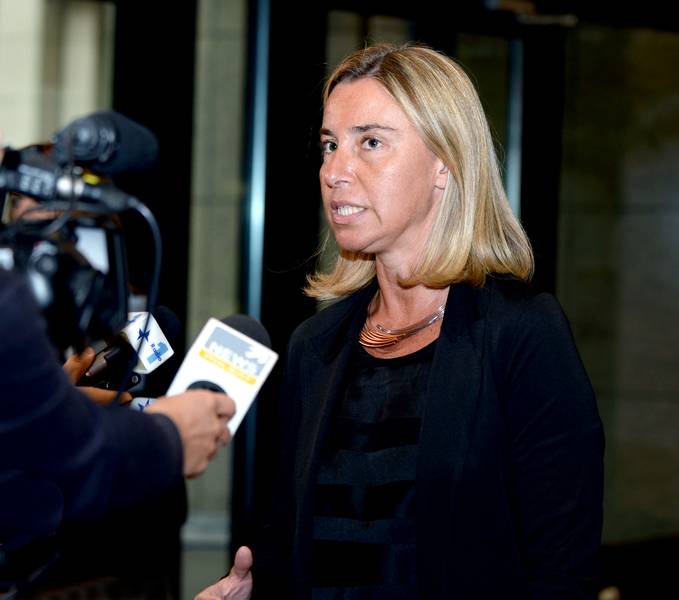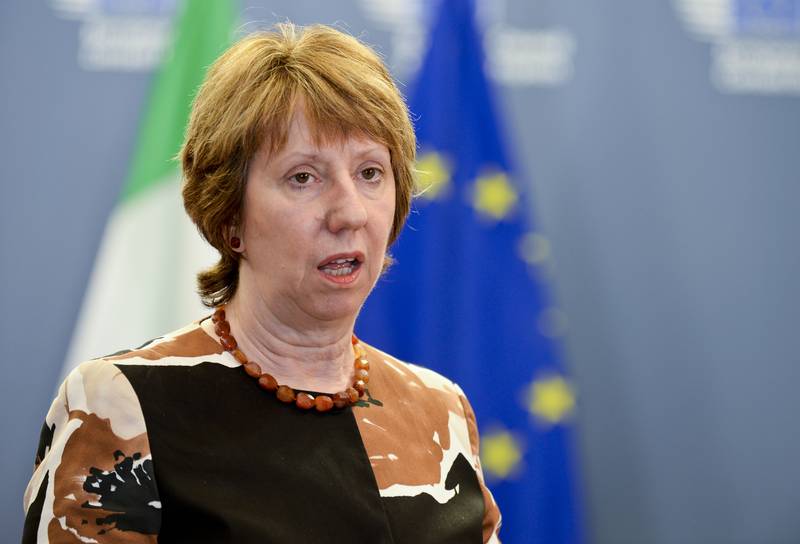Is Angela Merkel the New EU High Representative for Foreign Affairs?
Adelina Marini, August 21, 2014
 The EU is facing three huge foreign policy crises with potentially tragic consequences for security. Alas, these crises have again revealed the Union's incapability to act as a community. Until recently the main speakers on the Eastern crisis were the Baltic states, Poland and Sweden. On the crisis in Iraq and Syria mainly speak France, Italy and UK. And the crisis in Gaza is perceived as something that has always been there and that will always be there, therefore it is somewhat in the periphery of the European focus. However, the UK remains strongly committed to the developments in the Middle East. But lately, Germany seems to have taken the Eastern crisis in its own hands.
The EU is facing three huge foreign policy crises with potentially tragic consequences for security. Alas, these crises have again revealed the Union's incapability to act as a community. Until recently the main speakers on the Eastern crisis were the Baltic states, Poland and Sweden. On the crisis in Iraq and Syria mainly speak France, Italy and UK. And the crisis in Gaza is perceived as something that has always been there and that will always be there, therefore it is somewhat in the periphery of the European focus. However, the UK remains strongly committed to the developments in the Middle East. But lately, Germany seems to have taken the Eastern crisis in its own hands.
Last week, the EU foreign ministers interrupted their annual vacations to gather for an extraordinary meeting in Brussels to discuss these three crises plus the situation with Ebola in Africa and the situation in Libya. Extreme concern is expressed coupled with calls for immediate action on all these issues but these actions remain fragmented, individual and wishful. At a community level they are reduced to providing and coordinating international aid for the conflict zones, but, generally, the essential part is taken over by some member states. In spite of the phone conversations of European Commission President Jose Manuel Barroso several times a week with the presidents of Russia and Ukraine Vladimir Putin and Petro Poroshenko, the mediator's role on this crisis has been taken over by German Chancellor Angela Merkel and the EU's High Representative for foreign affairs Catherine Ashton was left with a protocol role.
A timeline of the transfer of foreign policy to Berlin
The European Commission and the high representative in particular have made almost automatic the publishing of statements, declarations and press releases expressing the EU's common views on any of all these crises that are raging along the Community's external borders. This, to some extent, was the purpose of the reform of the EU introduced with the Lisbon Treaty on 1 December 2009 when the post high representative was established with the main task to make the EU speak "with one voice". For maximum legitimacy, the high representative is both a member of the Commission and is chairing the Foreign Affairs Councils. So far, Catherine Ashton has managed to turn this post into something more than a purely protocol position with the huge breakthrough she achieved with the Belgrade-Pristina dialogue and the negotiations on the Iranian nuclear programme. An inherent part of the foreign policy portfolio is also the humanitarian aid and the enlargement and neighbourhood policies.
In that respect, the EU has acted like one. On 12 August the Commission announced it is increasing the humanitarian aid for Iraq with additional 5 million euros. International cooperation, humanitarian aid and crisis response Commissioner Kristalina Georgieva said she was appalled by the severe humanitarian situation which is deteriorating by the day. Around 200 thousand people are fleeing the Sinjar region in Northern Iraq only in August and need urgent aid. Ms Georgieva visited Baghdad and the Kurdish region in Iraq in March and announced the opening of a humanitarian office in Erbil. This week she again went to Iraq, but this time in the company of Swedish Foreign Minister Karl Bildt.
Also on August 12th, the Commission announced an increase of the humanitarian aid for Ukraine as well - 2.5 million euros. In this case, too, Ms Georgieva was the "voice" of the EU. President Jose Manuel Barroso, for his part, is in permanent contact with the presidents of Ukraine and Russia during which he underlines the EU's readiness to increase its support for the humanitarian efforts of the government in Kiev as well as in support of international humanitarian organisations. Mr Barroso also expressed several times his concern from the piling up of Russian forces along the Ukrainian border as well as the continued inflow of weapons, equipment and fighters from Russian territory. He called on Russia to use its influence to ensure that the civil population will be able to safely leave the conflict zones.
On every occasion Barroso underlined EU's "firm position" that Ukraine's sovereignty, territorial integrity and independence need to be maintained. The European Commission chief offered Russia's President Putin to work together for the stabilisation of Ukraine. So far so good, but it is evident that the crises are becoming much more serious and large scale actions are needed. But the evolution of the European response makes it clear that the common efforts are exhausted. That is why, the extraordinary meeting of the Union's foreign ministers was anticipated with huge interest.
They gathered in Brussels on 15 August to coordinate their positions on the three crises and to eventually come up with a common one. Even before the beginning of the meeting, however, Swedish Foreign minister Karl Bildt said a firm decision should not be expected because the ministers would rather discuss whether they shared the same assessment of the situation. To him, it was absolutely indisputable that Russia had entered into Ukrainian territory and called this a "huge violation of international law". This assessment is not shared by everyone in the EU, including by the European Commission. A spokesperson of the Commission said they were still gathering information and at this stage it is impossible to conclude that there was indeed an invasion by Russian military forces in Ukraine which were reportedly fired at by the Ukrainian army on Friday. Other ministers, too, were cautious in their reactions to such reports. This is understandable because if it is proved that there was such an invasion this would mean, practically, a declaration of war and the EU is evidently not ready for such a scenario.
In the foreign ministers' conclusions it is pointed out that any unilateral military actions by Russia in Ukraine, under any pretext, including humanitarian, would be perceived as a "blatant violation of international law". This is a very serious change of tone, but it is still not adequate to the size of the threat. Later, Italy's Foreign Minister Federica Mogherini, who is one of the official candidates to succeed Catherine Ashton as high representative of the EU for foreign affairs, said the news of a possible entry of a Russian military convoy in Ukraine and an Ukrainian attack against it emerged after the adoption of the Council conclusions. But she said the text about unilateral actions could be applied in such a case as well. However, she was much more interested in the developments in Iraq than in Ukraine.
Look who's talking
 The foreign ministers also point out that the European Union will actively support "any meeting format" that could lead to creating new political impetus. On 17 August German Foreign Minister Frank-Walter Steinmeier met with his colleagues from Ukraine, Russia and France and German Chancellor Angela Merkel visited Latvia and is planning a visit in Kiev. In the mean time, it has emerged that Russian President Vladimir Putin is organising a summit of the Customs Union (the foundation of the Eurasian Union) in Minsk and has invited the EU to attend. The Commission has confirmed that it accepted the invitation. The summit will not be attended by Jose Manuel Barroso, but by Catherine Ashton, Energy Commissioner Guenter Oettinger and Trade Commissioner Karel De Gucht. The purpose of the summit is to discuss the implementation of the Association Agreement with Ukraine and the impact it will have for the region, the possibility of reopening the energy negotiations and other political issues.
The foreign ministers also point out that the European Union will actively support "any meeting format" that could lead to creating new political impetus. On 17 August German Foreign Minister Frank-Walter Steinmeier met with his colleagues from Ukraine, Russia and France and German Chancellor Angela Merkel visited Latvia and is planning a visit in Kiev. In the mean time, it has emerged that Russian President Vladimir Putin is organising a summit of the Customs Union (the foundation of the Eurasian Union) in Minsk and has invited the EU to attend. The Commission has confirmed that it accepted the invitation. The summit will not be attended by Jose Manuel Barroso, but by Catherine Ashton, Energy Commissioner Guenter Oettinger and Trade Commissioner Karel De Gucht. The purpose of the summit is to discuss the implementation of the Association Agreement with Ukraine and the impact it will have for the region, the possibility of reopening the energy negotiations and other political issues.
Many of the big newspapers throughout the EU welcomed the decision of the German chancellor to actively engage in the search of a solution to the Russia-Ukraine conflict. The German Berliner Zeitung points out that in the past weeks the German government has been showing that it is, indeed, determined to take a huge international responsibility: a diplomatic leadership and crisis management. The Portuguese Diário Económico also writes that with its position on Ukraine Merkel has proved that she is ready to pay for stability. However, she would take a really huge international responsibility if she left the EU speak on behalf of everyone instead of capturing the functions of the high representative. Now, Catherine Ashton's achievement in her mediation in the Belgrade-Pristina dialogue seems belittled and it is the only major achievement of the common European foreign policy.
The French president, for his part, is well experienced in acting outside the EU with his decision to lead the taking down of Muammar Qaddafi in Libya. On the situation in Iraq he is, again, very active. In an interview with Le Monde, he calls for the organisation of an international conference to agree how to effectively counteract the large-scale and inhumane advance of the Islamic state in Iraq. And the EU foreign ministers agreed that some countries may participate in delivering arms to the Kurdish autonomous region in Iraq hoping that it will manage to stop the advance of the Islamists.
Seizing the functions of the high representative has other consequences, too, articulated by the Polish Super Express, which says that to Merkel Putin is much more important than the EU. "It's clear that we're being sold yet again - this time in the name of the economic and political interests of Germany and Russia", the article reads, quoted by eurotopics, the online portal for European press review. It is hard to understand from the foreign ministers' conclusions whether they have given Germany a mandate to speak on their behalf and to mediate for the solution of the Eastern crisis, although the door for that is opened with the phrase "any meeting format".
A week before the key EU summit which is expected to decide who will take the EU top jobs - the high representative and the president of the European Council - it is clear that we can safely drop "top" from the equation. With her decision to seize both posts to confront the Eastern crisis, Angela Merkel completely erased one of the Lisbon Treaty's biggest achievements, namely the first step toward establishing a genuinely common foreign policy. In this precise moment, the silence of the European Parliament is staggering. Given that this institution has squeezed the maximum of the formulations that concern it in the Lisbon Treaty, including in terms of the election of the European Commission president,  being in a continuous vacation at a time of really dangerous developments with the three crises is inexplicable.
being in a continuous vacation at a time of really dangerous developments with the three crises is inexplicable.
Instead of leading the efforts by calling an extraordinary plenary session or at least a meeting of the foreign affairs committee, there are only sporadic reactions by the president, Martin Schulz. This raises the question if the parliament is capable to respond to the huge power it demanded and received. Obviously not. A Merkel is enough for everything in the EU. The question is, though, whether she is seizing these functions because the post-holders are not good or because they are not allowed to do a better job. If it is the former, then the question is why were they chosen in the first place. This is where the European Parliament could have played a key role and could have shown consistency in condemning the intergovernmental approach because foreign policy is growingly more defined on the basis of intergovernmentalism rather than the community method.
 Federica Mogherini | © Council of the EU
Federica Mogherini | © Council of the EU | © Council of the EU
| © Council of the EU Luis De Guindos | © Council of the EU
Luis De Guindos | © Council of the EU